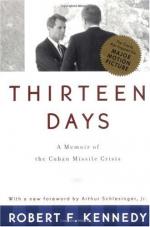|
This section contains 1,117 words (approx. 3 pages at 400 words per page) |

|
Mutual Superiority
By October 1962, humans control the power to obliterate their species, but their leaders feel constrained not to resort to nuclear armaments by the knowledge of the magnitude of destructive power at their disposal, the suddenness and swiftness with which it can be delivered, and the fact that "victory," which is historically defined as the unconditional surrender of the enemy has become a moot point, for little or nothing of either civilization can survive the holocaust. This creates the tension of "mutual superiority," later termed, more descriptively, as "Mutual Assured Destruction" or MAD. In October 1962, JFK chooses a path that offers a one in three change of nuclear war. During the Cuban missile crisis, there is no explosion because the American and Soviet leaders are both cautious, circumvent self-interests and allow the conflict to cool. Nevertheless, the missile crisis demonstrates an "awesome crack" between unlikely and impossible.
Under...
|
This section contains 1,117 words (approx. 3 pages at 400 words per page) |

|




